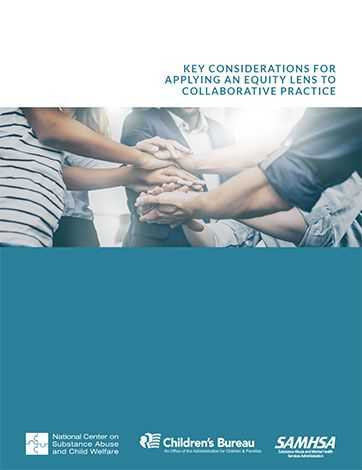Advancing Equity in Access to Care
Families of color and other diverse groups affected by substance use disorders often face a complex set of challenges leading to unequal access to services, disparate outcomes, and disproportionate representation in child welfare.
Highlighted Resources
Key Considerations for Applying an Equity Lens to Collaborative Practice

National Center on Substance Abuse and Child Welfare, 2022
This technical assistance brief helps collaborative teams formally assess existing policies to determine if and how they contribute to
...(Read More)Policy and Practice Resources
Addressing Disproportionality, Disparity, and Equity Throughout Child Welfare
Children’s Bureau, 2024
This webpage provides an introduction to racial equity as well as equity for tribes
... (Read More)What are jurisdictions learning and doing as they address racial disparities in child welfare?
Casey Family Programs, 2024
This brief provides a snapshot of perspectives and lessons learned from a group of
... (Read More)Racial Equity
National Child Welfare Workforce Institute, 2024
This list of resources supports child welfare staff and leaders as they confront
... (Read More)Creating an Affirming Culture and Climate for LGBTQIA2S+ Children and Young People in Child Welfare
Capacity Building Center for States, 2024
Sexual orientation and gender identity and expression (SOGIE) are important aspects
... (Read More)Improving Substance Use Prevention, Assessment, and Treatment Financing to Enhance Equity and Improve Outco...
American Academy of Pediatrics, 2022
This policy statement provides recommendations for financing substance use prevention
... (Read More)Key Considerations for Applying an Equity Lens to Collaborative Practice
National Center on Substance Abuse and Child..., 2022
This technical assistance brief helps collaborative teams formally assess existing
... (Read More)Disproportionalities and Disparities in Child Welfare: A Supplement to Understanding Substance Use Disorder...
National Center on Substance Abuse and Child..., 2022
This tool, a companion resource to the Online Tutorial for Child Welfare
... (Read More)Disrupting Stigma: How Understanding, Empathy, and Connection Can Improve Outcomes for Families Affected by...
National Center on Substance Abuse and Child..., 2022
Stigma affects the attitudes and actions of healthcare and treatment professionals
... (Read More)Disproportionality Rates for Children of Color in Foster Care Dashboard
National Center for Juvenile Justice, 2021
Interactive dashboard with national and state disproportionality rates for children
... (Read More)Implicit Bias Resource Guide: A resource to increase health equity and address implicit bias
National Institute for Children’s Health Qua..., 2019
This resource increases health equity and examines implicit bias.
... (Read More)Addressing Disproportionality
Child Welfare Information Gateway
This webpage has resources on issues such as overrepresentation in the child welfare
... (Read More)Stigma and Discrimination Research Toolkit
National Institute of Mental Health
This toolkit is a collection of evidence and resources related to stigma and
... (Read More)Related Online Training, Videos, and Webinars
Disrupting Stigma: A Virtual Conversation
Date: March 11, 2022
This virtual discussion shares information on how to create understanding, empathy, and connection to improve systems and services for
...(Read More)Threading Equity Throughout Child Welfare
Child Welfare Information Gateway, 2022
This episode features a conversation with Aysha E. Schomburg, J.D., associate
... (Read More)Strengthening Families Using a Racial Equity Lens
Administration for Children and Families, 2021
Learn how professionals can use an awareness of power to adopt and embrace an
... (Read More)Disrupting Stigma to Support Meaningful Change for Families in Family Treatment Court
Center for Children and Family Futures, 2021
This course invites family treatment court teams and practitioners to consider how
... (Read More)Recognizing Bias and Promoting Equity in Early Childhood Settings—Substance Abuse and Mental Health Service...
Date: January 13, 2017
This video features interviews with experienced infant and early childhood mental health consultants who discuss the importance of
...(Read More)State and Local Examples
How is Broward County, Fla., advancing racial justice for families involved with the child protection syste...
Casey Family Programs, 2022
Children of color are disproportionately represented at nearly every decision point
... (Read More)Brief: How did the blind removal process in Nassau County, N.Y., address disparity among children entering ...
Casey Family Programs, 2021
This brief describes Nassau County’s experience implementing a blind child removal
... (Read More)Additional Resources
Defining LGBTQ Terms and Concepts
Annie E. Casey Foundation, 2023
Young people in the LGBTQ community face high¬er rates of rejection, violence
... (Read More)Office of Behavioral Health Equity
Substance Abuse and Mental Health Services A..., 2022
The Office of Behavioral Health Equity coordinates SAMHSA’s efforts to reduce
... (Read More)